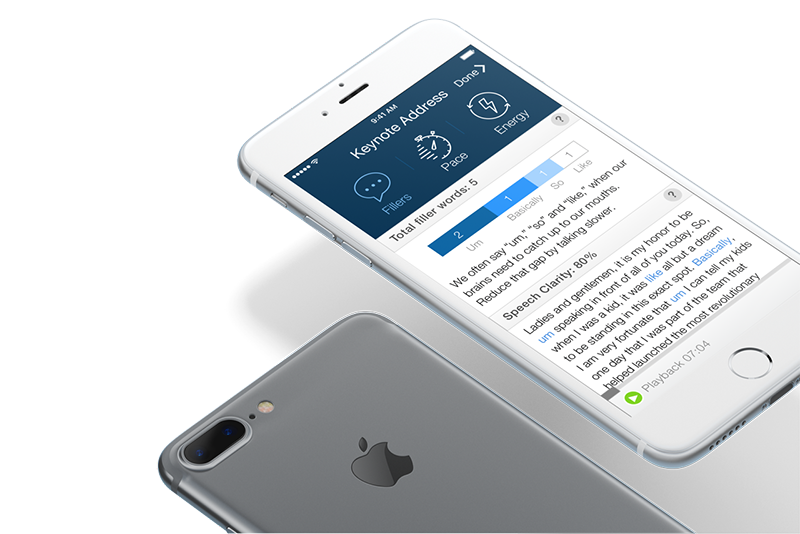By Lini S. Kadaba
 So, engineers have, um, a bad rep when it, uh, comes to, well you know, public speaking.
So, engineers have, um, a bad rep when it, uh, comes to, well you know, public speaking.
Techies aren’t known for the most scintillating of presentations and often use lots of filler words—see previous sentence. Certainly, Danish Dhamani ’17 can attest to that.
“I was not a really good speaker before,” allows the 22-year-old mechanical engineering senior at Drexel University who hails from Dar es Salaam, Tanzania. Before, that is, Orai.
The award-winning artificial intelligence product—think of it as a 21st-century Henry Higgins transforming any number of Eliza Doolittles—was conceived by Dhamani and roommate Paritosh Gupta ’18, a computer science junior from Indore, India, during a hackathon in 2015. Debuting this month [January] in app stores, the speech analysis software aims to help engineers and other public speakers improve content and delivery, says Dhamani, who co-founded a like-named company with Gupta.
How does it work? Record your speech via Orai, and the mobile app for both iPhone and Android devices flags those annoying filler words such as ums, likes and you knows; notes clarity of pronunciation; measures talking speed and length of pauses, and more. It even cautions users against overly technical content.
“Instead of practicing in front of your mirror or dog, you can practice in front of this app and get personalized feedback on your speech,” Dhamani says in his new-found measured tones sure to please Orai.
Public speaking, he notes, is not easy. About 75 percent of people get nervous when talking in public, according to Dhamani. In fact, surveys show that some people fear speaking in front of an audience more than death. Engineers have an added hurdle—the complexity of material that they often present.
“Any presentation in engineering classes is very detailed,” Dhamani says. “You talk about numbers, you talk about equations, you talk about different theories. You’re essentially trained from the beginning not to present in a way that touches the hearts of millions of people but to present to very technical people. That’s not good.”
 The app already has garnered kudos. It took first place in Drexel University’s Startup Day competition in November [2016]. It also won top honors in the 2016 pitch competitions OH-Penn for Business, besting 100 groups, and PittJohnstown LIVE.
The app already has garnered kudos. It took first place in Drexel University’s Startup Day competition in November [2016]. It also won top honors in the 2016 pitch competitions OH-Penn for Business, besting 100 groups, and PittJohnstown LIVE.
“It was not an easy thing to build,” Dhamani says. At the start of the PennApps hackathon, Dhamani and Gupta had no idea what to hack. As midnight approached, the two feared they would have nothing to present to the judges.
“That’s when the idea clicked,” says Dhamani. “Presenting is hard. Why don’t we build a technology that can help people present better or at least be less scared of it?”
By the end of the weekend, Dhamani and Gupta had a proof-of-concept version of Orai that got them in the Top 10. Since then, they have spent hours refining it. Around co-ops last spring[2016], each spent 30-hour weeks on the project, interviewing high-priced speech coaches and communications experts, reading computational linguistics papers and writing algorithms.
Since its beta launch in August [2016], the app has been further tweaked. In addition to the regular Orai, the company plans to offer two niche versions. Orai Sales would target sales reps, who depend on strong speaking skills to sell and meet quotas, with a video roll playing platform. (This product won the Drexel Startup Day contest.) Orai Classroom would focus on universities and secondary schools that offer public speaking classes. This term [2017], the University of Pennsylvania’s The Wharton School plans to participate in a pilot study, according to Dhamani.
As he researched his idea, Dhamani says he “got really passionate about public speaking.”
He joined Toastmasters, a club dedicated to public speaking, and attended events at a nearby campus. In the fall [2016], Dhamani started a chapter at Drexel. The lessons he learned through the club—speak with confidence, vary tone, slow down—have been incorporated into Orai.
The experience also confirmed in his mind the importance of a mobile app. Many of his friends couldn’t find time to attend Toastmasters even though they needed to sharpen their speaking skills. But with an app, they could practice anywhere, anytime. Dhamani so believes in the idea that he sought and received permission to forgo his third co-op and plans to graduate a year earlier to devote time to the company.
“Public speaking is not something you’re born with,” he says. “It’s something you can actually learn through practice.”
Especially when Orai is in your corner.
Dhamani offers these top three tips to engineers based on talking with communications professionals during the development of the mobile app Orai.
-
Be less technical and more empathetic. The app notes content with too many figures and run-on sentences.
- Practice, practice, practice. Orai encourages practice through its real-time feedback, which gives the feel of someone listening to the speech.
- Be excited. Orai analyzes the variance in tone during a speech and points out monotone delivery.